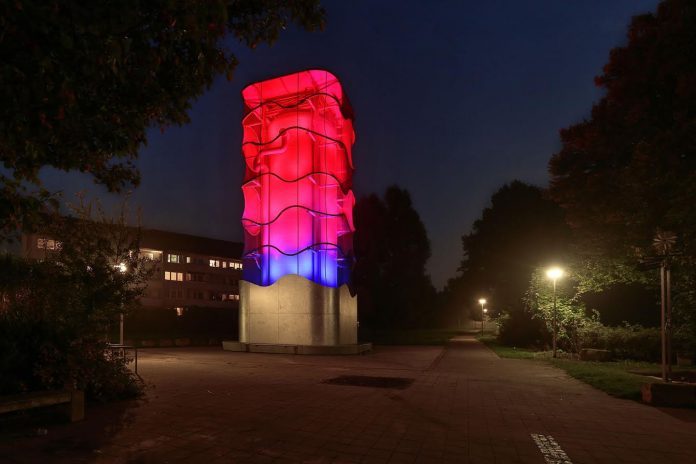The impressive 17.5 metre high 4 metre wide structure which resembles a quirky piece of contemporary sculpture was designed by pape+pape Architekten from Kassel. It contains an internal cylindrical water feature which is illuminated by the ArcSources which are programmed to indicate how much of the energy generated from the nearby natural gas-fired combined heat and power plant (CHP) … is currently stored and available for use.
The lighting installation was commissioned by energy company Energieversorgung Hildesheim (EVI) and the lighting design was imagined and delivered by locally based architectural lighting specialist SSP Design, with Matthias Schiminski and Henrik Nolte as the project’s lead engineer and designer.
When there is a lot of energy stored up and available for use to heat the nearby homes, the 20,000 litre water feature glows red. When there is less available, the colour gradually morphs through to blue.
EVI and the city’s planning and development department Gemeinnützige Baugesellschaft Hildesheim (gbg) initiated the plan which also involved the renovation of heating systems in 1600 homes over two and a half years, at a cost of around 3 million Euros.
The new heat storage system ensures the highest levels of flexibility and efficiency by storing un-needed heat that is generated during the power production process … which is then available for later use when the demand is higher.
Drispenstedt local council was also a partner in the project, and one of their stipulations was that during the hours of darkness, the illumination should not be any brighter than the surrounding street and ambient lighting levels, and therefore not intrusive or distracting to residents.
Being right in the heart of a residential district, it was also imperative that the indicator structure was aesthetically pleasing in its own right, and something that Arne Heims, Mayor of Drispenstedt, could proudly describe as blending “seamlessly and attractively into the district, becoming a real landmark”.
Lighting was essential for the achievement of this goal.
Matthias had specified Anolis for a previous project and found the products to be reliable and robustly built. He knew the flexible DMX controllability and super-smooth homogenised colour mixing of the ArcSource 1MC enabled via the multichip LED engine would be a perfect solution.
He explained that they also wanted a small and unobtrusive fixture and, in keeping with the new heating system deriving 90% of its energy from environmentally friendly means … it had to be an LED!
The ArcSources are positioned back-to-back and vertically orientated on a series of special brackets that run up the height of the tower providing beautiful colour transitions.
The main challenge for the lighting installation was the timeframe.
The structure’s perforated exterior membrane was fitted over the quirky, uneven steel sub-frame only a few days after the construction of the tower was completed by a team from local specialist, Technik-Werft.
Due to its resulting interesting shape and multiple curved surfaces – evoking horizontal layers of water – an amount of experimentation was needed to optimise the lighting.
The goal was to have a dynamic mix between light movement and even coverage, so several different angles were required to get the fixtures perfectly aligned.
The Anolis ArcPower drivers are connected to a port on the power generator control system, so they can receive the correct capacity and thermal data as related to the storage status, which is converted to DMX and then change the colour of the fixtures.
The shifting energy storage levels are an effect that people can watch in real time and this has helped the installation become the local talking point that was envisioned.
www.anolis.eu





